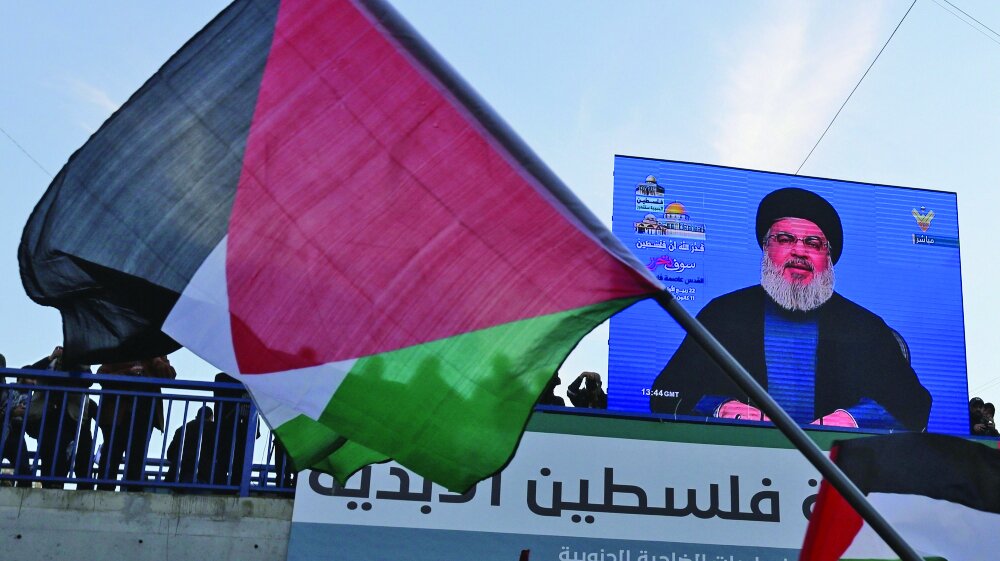Sayyed Hassan Nasrallah: Eternal defender of Palestine and the Resistance

TEHRAN - Hezbollah Secretary General Sayyed Hassan Nasrallah was one of the most defining figures in West Asian politics and a steadfast champion of the Palestinian cause. For decades, he embodied the spirit of resistance, articulating a vision of dignity, justice, and steadfastness in the face of occupation.
His leadership transformed Hezbollah into a central force not only in Lebanon but also across the region, inspiring generations of Arabs and Muslims who saw in him a voice of defiance and hope. Until his martyrdom in an Israeli airstrike on September 27, 2024, in Beirut, Nasrallah never wavered in his commitment to the liberation of Palestine, which he considered a sacred duty and a moral obligation.
Early commitment to the Palestinian struggle
From his earliest years as a leader, Nasrallah emphasized that the land of Palestine, from the Mediterranean Sea to the Jordan River, rightfully belonged to the Palestinian people. He consistently rejected any settlement that would diminish their rights or undermine their sovereignty. For him, the question of Palestine was not merely political but deeply ethical and spiritual — a struggle between justice and occupation, dignity and oppression.
In his speeches, Nasrallah framed the Palestinian issue as central to the destiny of the Arab and Islamic world. He reminded audiences that the occupation of Jerusalem (al-Quds) was not a Palestinian burden alone but a wound in the heart of the entire region. He repeatedly condemned Israeli aggression as an affront to humanity, describing the Zionist project as illegitimate and destabilizing to West Asia.
This unwavering stance distinguished him from other leaders who, at times, shifted their positions under political pressure. For Nasrallah, supporting Palestine was non-negotiable — it was the compass of resistance and the essence of Hezbollah’s identity.
Support during the Gaza war
The Israeli war on Gaza in October 2023 brought Nasrallah’s commitment to Palestine into sharp relief. As Israel launched one of its deadliest campaigns against the besieged strip, Hezbollah initiated strikes on Israeli military positions in the north, opening a supportive front to relieve pressure on Gaza. These operations were not random but carefully calculated acts of solidarity, designed to show that Palestinians were not alone.
On October 8, 2023, Nasrallah declared Hezbollah’s readiness to intervene, making clear that the resistance in Lebanon stood shoulder to shoulder with Gaza. His words carried weight not only among Palestinians but also across the Arab world, where many felt abandoned by governments unwilling to act.
In November of the same year, he publicly praised Hamas’ Al-Aqsa Storm operation, describing it as a historic turning point in the struggle against Israel. He stressed that the operation was “100 percent Palestinian,” highlighting its authenticity and the ingenuity of the resistance. For Nasrallah, this event symbolized a new era: Palestinians had broken through Israeli security myths, and their actions had electrified supporters of resistance throughout the region.
Military and strategic support
Under Nasrallah’s leadership, Hezbollah’s support for Palestine was not limited to words. Its practical efforts strengthened the capacity of Palestinian fighters to resist Israeli offensives and demonstrated the Lebanese movement’s role as an active partner in the broader resistance axis.
Hezbollah’s military engagements served both practical and symbolic purposes. Practically, they disrupted Israeli operations and forced the occupation to fight on multiple fronts. Symbolically, they reassured Palestinians that their struggle was part of a larger movement uniting Lebanon, Syria, Iraq, Iran, and beyond against Israeli aggression.
Nasrallah often explained that this support was not conditional or transactional but rooted in ideological solidarity. He described the resistance as a shared mission — a defense of justice and human dignity against oppression.
Diplomatic and political relations
Nasrallah’s role extended beyond the battlefield. He cultivated close ties with Palestinian leaders, providing them with political backing and moral encouragement. In September 2024, shortly before his martyrdom, Hamas leader Yahya Sinwar wrote to Nasrallah to express deep gratitude for Hezbollah’s steadfast support during Israel’s war on Gaza. The letter highlighted how Hezbollah’s actions, sacrifices, and solidarity had fortified the morale of Palestinians under siege.
In 2024, following the assassination of former Hamas leader Ismail Haniyeh in Tehran — an attack widely attributed to Israel — Nasrallah expressed heartfelt condolences and reaffirmed his solidarity with the Palestinian people. These gestures were not symbolic formalities; they reflected a deep brotherhood and a shared destiny that bound Hezbollah and Palestinian resistance movements together.
Rejection of compromise
A defining aspect of Nasrallah’s approach was his categorical rejection of political compromises that undermined Palestinian rights. He consistently opposed proposals that ignored the right of return for Palestinian refugees or legitimized Israeli control over occupied territories. For him, any “solution” that did not restore full Palestinian sovereignty and dignity was unacceptable.
This principled stance distinguished Hezbollah from regional actors who sometimes pursued negotiations with Israel under Western pressure. Nasrallah argued that concessions only emboldened the occupier and weakened the resolve of the oppressed. Instead, he insisted that steadfast resistance — both military and cultural — was the only path to liberation.
Martyrdom and legacy
Nasrallah’s martyrdom in September 2024 marked the end of an era but not the end of his influence. His speeches, strategies, and vision continue to inspire Hezbollah and the wider Axis of Resistance. For Palestinians, his legacy is one of unwavering loyalty: a leader who never abandoned their cause, who supported them in moments of despair, and who treated their struggle as his own.
In Lebanon and across the Arab world, Nasrallah is remembered as a symbol of dignity and defiance, a man who challenged the most powerful armies and governments with courage and faith. His life exemplified the idea that resistance is not merely a tactic but a moral principle — one that demands sacrifice but also promises honor and eventual victory.
For the people of Palestine and all who stand against occupation, Nasrallah remains a guiding light, a reminder that dignity is non-negotiable and that liberation is possible through steadfastness and faith.
Leave a Comment